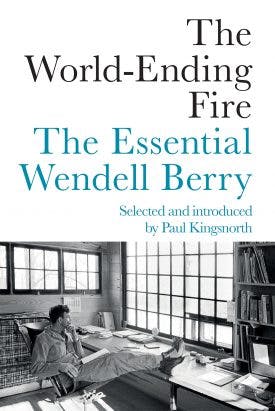It would be as reductive to call Wendell Berry a conservationist as it would be to call him an essayist. In the 31 pieces collected in The World-Ending Fire: The Essential Wendell Berry, the National Humanities Medal-winning poet, novelist, essayist, conservationist and farmer expounds on topics that range from farming, technology, economics, man’s proper relationship to nature, government, and social movements, to industrial disasters, marriage, the human acquisition of knowledge, drowning, labor, animal husbandry, eating, education, the Bible, Huckleberry Finn, and pleasure. Written between 1968 and 2011, all of the essays are ultimately about the same thing: how to live a rightly-ordered life.

Berry is not the type of chipper environmentalist who believes that capitalism can persist unabated as long as we install more solar panels. Nor is he the type of cerebral climate catastrophist who considers all action futile, opting instead to mutter into his wine glass about the anthropocene. In his view, the rightly-ordered life respects nature’s ability to give us sustenance and to destroy us, as it brings both the yearly flowering of bluebells and the deadly currents of the flooded Kentucky River. Topsoil is “Christ-like in its passivity and beneficence.” Nature is, in the words of the poet Edmund Spenser, “the greatest Goddesse… the ‘equall mother’ of all,” who “knittest each to each, as brother unto brother.’” She operates as God’s deputy to mete out earthly justice. And she has a warrant out for us.
Perhaps it makes sense for a man whose outlook is based on a kind of mysticism to eschew political categories and to be leery of social movements. The World-Ending Fire includes the 1998 essay “In Distrust of Movements,” in which Berry claims that political movements are ineffective because they tend to focus myopically on single issues instead of on structures, and because their language is often co-opted by corporations. He claims elsewhere that large-scale solutions inevitably ignore the particularities of local cultures and local ecosystems. “My own inclination,” he told Sarah Leonard in a 2012 interview for Dissent, “is not to start with a political idea or theory and think downward to the land and the people, but instead to start with the land and the people, the necessity for harmony between local ecosystems and local economies, and think upward to conserving policies such as those of the 50-Year Farm Bill.”
On the whole, this political ambivalence works to Berry’s advantage, allowing him a kind of broad appeal that few anti-capitalists or conservationists enjoy. He has a large conservative and Christian readership that is drawn to his promotion of housekeeping, agriculture, humility, and devotion to community. He is also admired by proponents of farm-to-table eating like Mark Bittman, who calls him “the soul of the real food movement.” Berry and his wife Tanya famously run a farm in Port Royal, Kentucky which relies on horse-drawn plows. In “The Making of a Marginal Farm,” from 1980, he describes “producing nearly everything that we ate: fruit, vegetables, eggs, meat, milk, cream, and butter.” In “The Pleasures of Eating,” from 1989, Berry urges readers to grow and prepare their own food, at least to the extent that it’s possible. “I like to eat vegetables and fruits that I know have lived happily and healthily in good soil, not the products of the huge, bechemicaled factory-fields,” he writes.
The trouble is, most of the essays in The World-Ending Fire deal with with topics that are, at heart, political. In “Economy and Pleasure,” from 1988, he writes about incipient American inequality in the aftermath of the Farm Credit Crisis and two rounds of Reagan tax cuts:
The ideal of competition always implies, and in fact requires, that any community must be divided into a class of winners and a class of losers. The losers simply accumulate in human dumps. The idea that the displaced and dispossessed “should seek retraining and get into another line of work” is, of course, utterly cynical. There is no limit to the damage and the suffering implicit in this willingness that losers should exist as a normal economic cost.
The danger of the ideal of competition is that it neither proposes nor implies any limits. It proposes simply to lower costs at any cost, and to raise profits at any cost. It does not hesitate at the destruction of the life of a family or the life of a community. It pits neighbor against neighbor as readily as it pits buyer against seller. Every transaction is meant to involve a winner and a loser. And for this reason the human economy is pitted without limit against nature.
At times it is frustrating that political categories and ideologies as such rarely figure into his work, though he examines their effects. Wary of large-scale solutions and “government planning,” in World-Ending Fire, Berry repeatedly rails against “bureaucrats.” “We have failed to produce new examples of good home and community economies,” he writes in “Word and Flesh,” from 1989. “Without examples, we are left with theory and the bureaucracy and meddling that come with theory.” Writing, here, in the wake of the Exxon Valdez oil spill, he finds the environmental movement lacking; the best way to make a disaster like this less likely to happen again, he argues, is for individuals to become less dependent on fossil fuels. Never mind that one of the reasons so many individuals are dependent on fossil fuels is that fuel companies in the United States contrived to kill public transit and make American communities car-dependent.
Today’s most pressing environmental threats require large-scale solutions. Alyssa Battistoni has made the case that a universal basic income could lay the groundwork for an economy not centered on growth but on respect for nature’s limits. And Ryan Cooper has proposed that the most effective way to address climate change would be through a “green New Deal.” Both of these solutions are big and centralized, and would require government intervention, which would require building broad public support—through the work of politics. To take big solutions off the table is a kind of giving up.
But Berry reminds us that to take small solutions off the table is also a kind of giving up. Some conservationists believe that because ecological problems are structural, there is no point in growing and cooking your own food, in setting down roots in a community, in being kind to your neighbors. Because you don’t personally own an oil corporation or an agribusiness concern, because you are but one interchangeable unit in a system that doesn’t care if you live or die, you may as well drive as much as you want, waste paper towels, and buy meat from corporations that keep pigs in excrement-coated cages. Berry reminds us that to live this way is to forfeit our souls. It is important—no matter what is going on at a macro level—to be kind to your family, your neighbors and the land.
